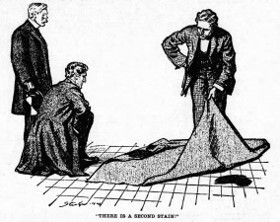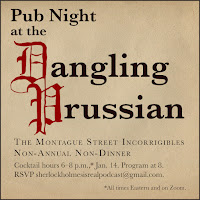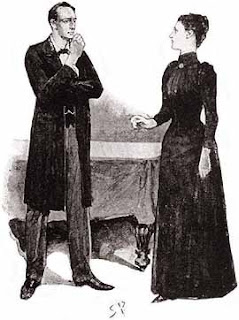A Second Look at "The Second Stain" by Rich Krisciunas
After the public’s reaction to Sherlock Holmes’ death in "The Final Problem," Conan Doyle didn’t dare kill him off again, but he made a slight move towards ending the stories by retiring the detective to raise bees in Sussex Downs. At this point in his career, Conan Doyle was one of the world's highest-paid authors. For the six stories that would appear in the book The Return of Sherlock Holmes he had received $25,000 from the American magazine Collier's Weekly, and £100 per thousand words from The Strand.
The last story in that book was “The Second Stain,” a story of murder, international spies, and blackmail. It was first published in The Strand Magazine, December 1904 and Collier’s Weekly, January 28, 1905. For chronologists the story is thought to have occurred in the late 1880’s but Watson tells us he must be vague on the details of dates for reasons the public will understand and can only say that it began “on a Tuesday in autumn.” Baring-Gould sets the story in October 1886, while others like Historical Sherlock set it in 1888.
The story begins at a familiar Canonical place with Holmes and Watson together at Baker Street. Unlike earlier stories where Holmes is bored or reads Watson’s thoughts or makes deductions based on a client’s clothing, our story begins immediately with the arrival of two important people from the British government, Prime Minister Lord Bellinger and Trelawney Hope, Secretary for Foreign Affairs.
Some scholars have guessed that the potentate was Kaiser Wilhelm of Germany. Holmes learns that if the information in the letter is revealed it could start a world war! Hope feels the letter is so important that he can’t leave it in a safe at his government office but has to bring it home.
Hope last saw the letter at 7:30 pm. His wife, allegedly, went out and he went to bed after she returned at 11:30 p.m. so there is a four-hour window of opportunity for the thief.
After eliminating the household staff, who does Holmes first suspect as the possible thief? Three international spies and secret agents, “… there are Oberstein, La Rothiere, and Eduardo Lucas.” Holmes plans to see each of them. But Watson tell Holmes that Lucas who lived near Hope’s home has been murdered last night. We’ll see Hugo Oberstein again in The Bruce-Partington Plans in His Last Bow. As Holmes does on many occasions in the stories, we learn many details about the victim and the killing from a newspaper account.
The action stays at Baker Street. We haven’t left 221B yet as we get our first glimpse of Lady Hilda Trelawney Hope. Lady Hilda wants Holmes to tell her the details of the missing letter. But, of course, Holmes cannot. So she leaves and Holmes gives us one of his great lines. "Now, Watson, the fair sex is your department," said Holmes, with a smile, "What was the fair lady's game? What did she really want?"
Holmes then tells us what he thinks about women. “…the motives of women are so inscrutable. You remember the woman at Margate whom I suspected for the same reason. No powder on her nose—that proved to be the correct solution.” For Holmes, Men are from Mars and women are from Venus. “Their most trivial action may mean volumes, or their most extraordinary conduct may depend upon a hairpin or a curling tongs."
Does Holmes know women? Can he read their thoughts like he does with Watson or men?
Back to the story. I like to look at the structure of the stories. So far, we have met the three key characters; Bellinger, Hope and Lady Hilda. Where are we? Everything has occurred at 221B. This could be a script from a play.
Two days pass and Holmes is lost in his thoughts. He smokes, runs in and out, visits the crime scene where Lucas was killed, plays his violin and munches on sandwiches. There has been a police investigation and a coroner’s inquest and Watson hasn’t left Baker Street during that entire time. “
What device does the author use to give us details of the status of the investigation? In the Canon, some of the most important information and details don’t come to us from live characters we meet but rather, this critical information is provided through newspaper articles masquerading as characters. Conan Doyle uses this convenient vehicle in many stories to save time and fill in gaps as opposed to longer dialogue. Frequently, Holmes listens while Watson reads aloud a newspaper story providing details of a police investigation, a coroner’s inquest or the background of a person who has been murdered.
There are at least 20 other examples of Holmes or Watson citing important information from newspaper articles in “the morning papers,” “the daily papers,” “the evening papers,” “the English papers,” “the society pages,” “the foreign papers” as well as advertisements in agony columns. Here, we learn that Lucas’ valet was initially arrested in relation to the murder but he had an alibi that cleared him.
After three mornings, Watson still hasn’t budged and the mysteries of the potentate’s letter and the murder remained unsolved. Another newspaper account provides us with more key details. As a former journalism major, I am amused by what the papers report: “Yesterday a lady, Mme. Henri Fournaye, was reported to the authorities by her servants as being insane.” Have you ever read such a story in your morning paper?
The police discovered that she was the wife of the murdered Lucas, who was leading a double life, and there is evidence to connect her with his killing. “It is probable that the crime was either committed when insane, or that its immediate effect was to drive the unhappy woman out of her mind. … doctors hold out no hopes of reestablishment of her reason.” How these reporters get this medical information without making FOIA requests amazes me.
Note how Doyle’s writing reflects some 19th century stereotypes and prejudices of people of color who were considered to be more prone to emotional extremes than whites. The newspaper tells us: “Mme. Fournaye, who is of Creole origin, is of an extremely excitable nature, and has suffered in the past from attacks of jealousy which have amounted to frenzy.”
So Holmes decides he has to revisit the crime scene where Lucas was killed. And our chronicler, Watson, finally gets to leave 221B. The scene shifts to Lucas’ apartment where Lestrade tells Holmes there is a problem and points to an ugly, irregular blood stain upon the carpet in the center of the room.
There is no stain on the white floor under the blood-stained carpet. The blood should have soaked through. Then, Lestrade points out a second stain on the white floor covered by a carpet that doesn’t have blood on it. Holmes figures it out. "Why, it is simple enough. The two stains did correspond, but the carpet has been turned round." But Lestrade asks by whom and why?
Out of curiosity, why didn’t Holmes spot that issue the first time he went there?
While Lestrade pressures poor constable MacPherson to confess that he let a woman into the house to view the scene, Holmes finds an empty secret compartment under the carpet.
As Holmes leaves the house, he shows the constable Lady Hilda’s photograph. This confirms to Holmes that she was the woman who was at the scene after the killing of Lucas and Holmes has solved the case. Holmes reveals, “You will be relieved to hear that there will be no war, … Trelawney Hope will suffer no setback in his brilliant career, … that the Prime Minister will have no European complication.”
So far, the action has been at Baker Street, Baker Street, then, moved to Godolphin Street where Lucas was killed and now shifts to the home of Lady Hilda for the grand climax.
Holmes confronts her : “I know of your visit to Eduardo Lucas, of your giving him this document, of your ingenious return to the room last night, and of the manner in which you took the letter from the hiding-place under the carpet."
Ultimately, she gives Holmes the letter. Holmes replaces it in the dispatch box and Lady Hilda returns it to the bedroom. Holmes then asks Trelawney Hope to make sure that the letter isn’t still in the dispatch box and it is! The prime minister, sensing something fishy, asks Holmes what really happened and the story ends as Holmes gives the clever response, “We also have our diplomatic secrets.”



























































